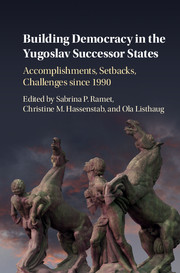 Building Democracy in the Yugoslav Successor States
Building Democracy in the Yugoslav Successor States Book contents
- Frontmatter
- Dedication
- Contents
- List of Boxes
- List of Figures
- List of Tables
- Notes on Editors
- Notes on Contributors
- Preface
- Part I Introduction and Theory
- Part II Country Studies
- 7 Building Democracy in Serbia: One Step Forward, Three Steps Back
- 8 Building Democracy in Croatia since 1990
- 9 A Durable Oligarchy: Bosnia and Herzegovina's False Post-War Democratic Transition
- 10 Liberal Democracy in Slovenia: From Seventh Heaven to the Lobby of Hell in Only Two Decades?
- 11 Macedonia's Post-Yugoslav Reality: Corruption, Wiretapping, and Stolen Elections
- 12 Building Democracy in the Western Balkans: The Case of Kosovo
- 13 The Trajectory and Parameters of Democratic Transition in Montenegro
- 14 Building Democracy in Vojvodina
- Part III Conclusion
- Further Reading
- Index
11 - Macedonia's Post-Yugoslav Reality: Corruption, Wiretapping, and Stolen Elections
from Part II - Country Studies
Published online by Cambridge University Press: 25 May 2017
- Frontmatter
- Dedication
- Contents
- List of Boxes
- List of Figures
- List of Tables
- Notes on Editors
- Notes on Contributors
- Preface
- Part I Introduction and Theory
- Part II Country Studies
- 7 Building Democracy in Serbia: One Step Forward, Three Steps Back
- 8 Building Democracy in Croatia since 1990
- 9 A Durable Oligarchy: Bosnia and Herzegovina's False Post-War Democratic Transition
- 10 Liberal Democracy in Slovenia: From Seventh Heaven to the Lobby of Hell in Only Two Decades?
- 11 Macedonia's Post-Yugoslav Reality: Corruption, Wiretapping, and Stolen Elections
- 12 Building Democracy in the Western Balkans: The Case of Kosovo
- 13 The Trajectory and Parameters of Democratic Transition in Montenegro
- 14 Building Democracy in Vojvodina
- Part III Conclusion
- Further Reading
- Index
Summary
How successful or unsuccessful has Macedonia been since its declaration of independence in 1991? The question sounds simple enough. At first glance, one is inclined to say that it has been unusually unsuccessful, even by Balkan standards. The country has been blocked by Greece in its quest to join the European Union (EU) and NATO, was forced – again by Greece – to change its flag and modify its constitution to renounce territorial aspirations it never nurtured, and was admitted to the United Nations only under the humiliating name Former Yugoslav Republic of Macedonia – a designation which suggests to Macedonians that their state is a kind of pariah. Then there is the fact that 30.4 per cent of its people were living below the poverty line in 2011 (see the Introduction to this volume). Again, as noted in the Introduction, Macedonia's ranking on press freedom in 2015 was the lowest among the seven Yugoslav successor states. And finally, there is the extent of corruption through which the ruling party has maintained itself in power since 2006 (detailed below in the subsection Allegations of Abuse of Power and in the section Political Transformation II below).
On the other hand, Macedonia was successful in staying out of the War of Yugoslav Succession (1991–95) as well as the 1999 War for Kosovo, avoided being carved up between Greece and Serbia in 1992, and has been relatively successful in boosting revenue from tourism, earning 110 million euros from that sector in 2013. In addition, in 2001, an Albanian insurgency was successfully resolved with the signing of the Ohrid Peace Accords (discussed below).
In March 2004, the Republic of Macedonia applied for membership in the European Union. The European Commission reviewed the country's application and delivered a favorable opinion in November 2005 and, the following month, Macedonia was granted candidate status. In order to gain membership in the EU, Macedonia will have to meet certain criteria laid down by the European Council at its meeting in Copenhagen, Denmark, in June 1993.
- Type
- Chapter
- Information
- Building Democracy in the Yugoslav Successor StatesAccomplishments, Setbacks, and Challenges since 1990, pp. 287 - 320Publisher: Cambridge University PressPrint publication year: 2017
- 7
- Cited by


